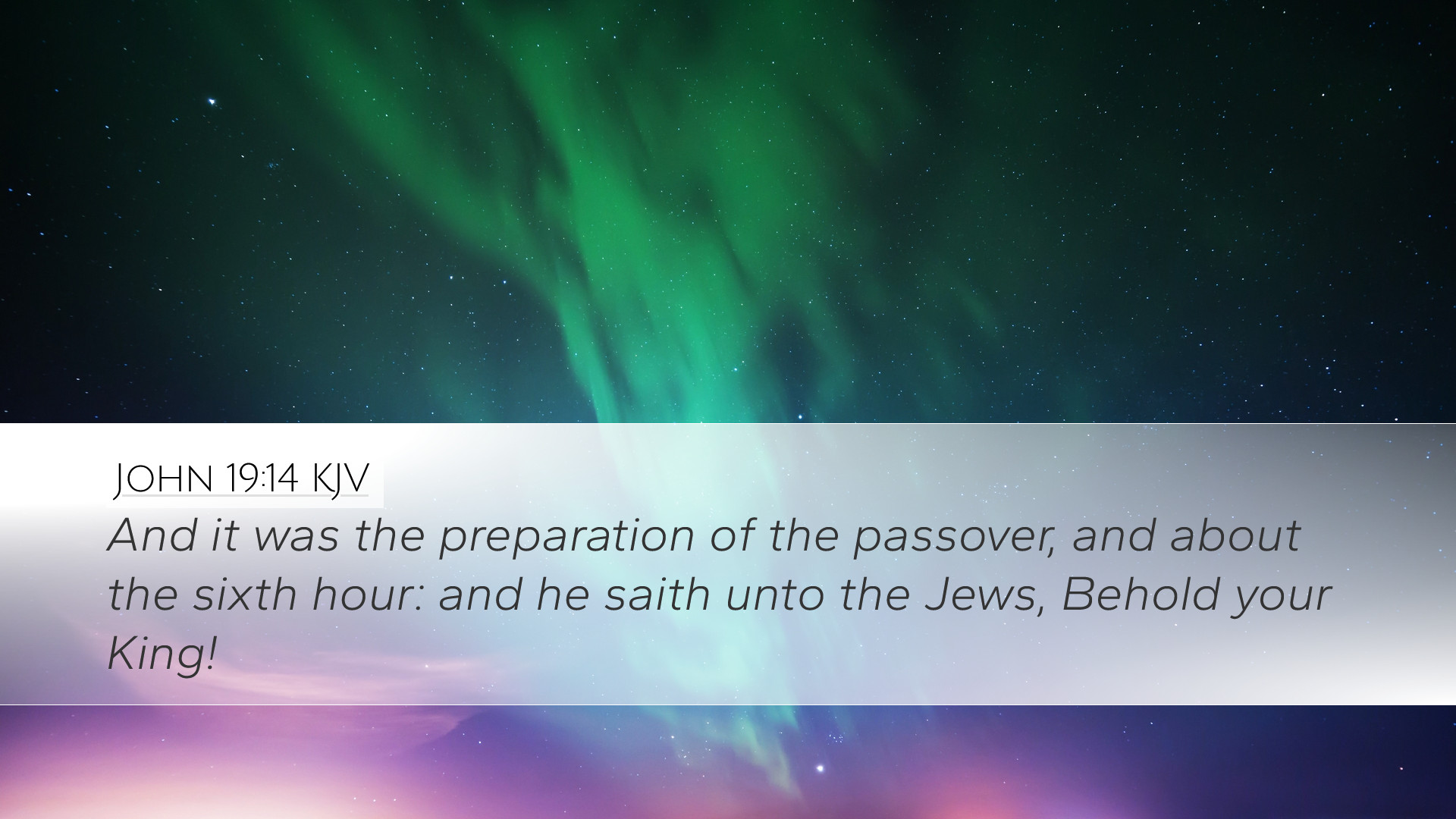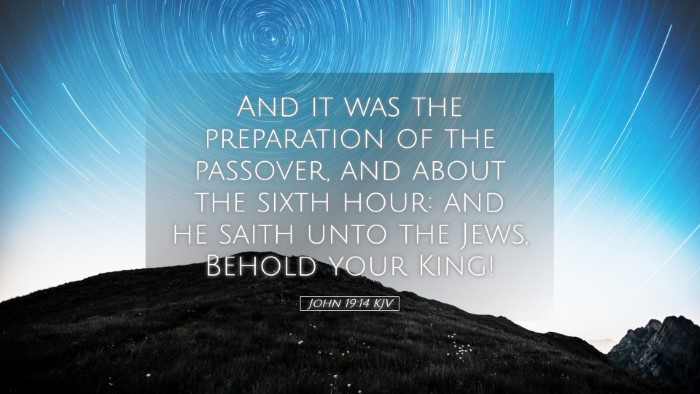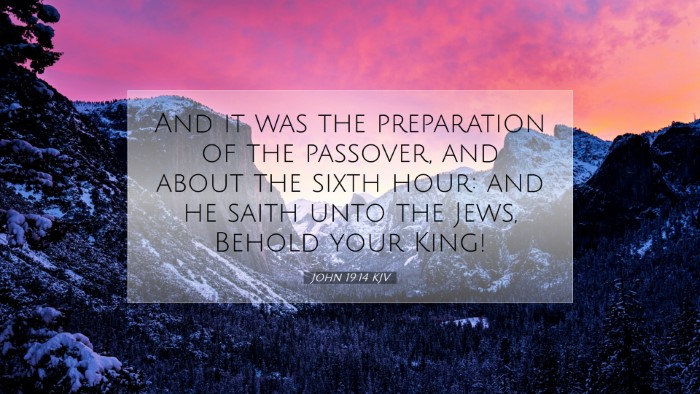Commentary on John 19:14
John 19:14 (KJV): "And it was the preparation of the Passover, and about the sixth hour: and he saith unto the Jews, Behold your King!"
Contextual Overview
This passage occurs at a critical moment in the passion narrative, encapsulating the tension between political power, religious authority, and the fulfillment of Scripture. It unfolds as Jesus stands before Pilate, the Roman governor, where charged accusations from the Jews shape the ensuing drama.
Analysis of Key Elements
Preparation of the Passover
The phrase "preparation of the Passover" refers to the day preceding the Feast of Unleavened Bread, a significant time in the Jewish calendar. Matthew Henry emphasizes the importance of this timeframe, noting that preparations for such a holy festival would have heightened the atmosphere and solemnity surrounding the crucifixion. Adam Clarke elaborates on this, stating that while the Jewish authorities were preparing for the Passover, they ironically orchestrated the betrayal and condemnation of the true Passover Lamb, Jesus Christ.
About the Sixth Hour
The reference to "about the sixth hour" (noon) further highlights the urgency of the events leading to the crucifixion. Albert Barnes points out that this specific timing is significant as it denotes the height of the day, symbolizing not only the physical intensity but also the spiritual climax of Israel’s rejection of their Messiah. The sixth hour contrasts with the Jewish calculations of time which would place the hour mid-morning, enhancing the observation that the day begins to age under the shadow of the cross.
Behold Your King
Jesus' proclamation, "Behold your King!" carries profound ironies. Matthew Henry interprets this as a moment of mockery, where Jesus is presented not in a royal manner, but dressed in a crown of thorns, highlighting the world's rejection of Him. Clarke adds that Pilate intended to provoke sympathy among the people, yet the phrase served as an ultimate declaration of Jesus' rightful claim to kingship, even amid their disdain. The audacity of Pilate's words lay in their prophetic truth—Jesus was indeed their King, though they failed to recognize Him.
Theological Implications
This moment operates on multiple theological levels, demonstrating God’s sovereignty, the fulfillment of Old Testament prophecies, and the nature of Christ's kingship. Each element intricately weaves into the overall narrative of redemption, where the preparation for Passover serves as a reminder of deliverance. Barnes notes that Jesus was presented at the Passover season as the ultimate fulfillment of the sacrificial system, taking upon Himself the sins of the world.
God's Sovereignty
The verse illustrates God’s overarching control over redemptive history. Even in the face of human betrayal and condemnation, God’s plan proceeds toward its predetermined end. The Jewish authorities' actions, instead of thwarting divine intention, fulfill it by leading to the sacrifice of Christ. Clarke observes that the Lord's intentional placement within this context of Passover underlines the irony of the very people who should recognize Him as their Messiah, failing to do so.
Fulfillment of Prophecy
Jesus’ trial and crucifixion fulfill numerous prophetic words, affirming the truth of Scripture. Henry notes that this moment confirms the prophetic words of Zechariah regarding the coming King, who is humble and riding on a donkey, juxtaposed with the disregard and scorn he receives. The irony is poignant: the very festival celebrating liberation became the stage for humanity’s ultimate rejection of God’s gift of salvation.
The Nature of Christ’s Kingship
Jesus' kingship is characterized by humility and servanthood, offering a stark contrast to earthly models of power and authority. As Pilate proclaims Him king, it reflects a misunderstanding of what true kingship entails. Barnes emphasizes that unlike worldly rulers, Christ reigns through sacrifice rather than dominion, inviting reflection on the nature of authority within the Kingdom of God. Here lies a critical lesson for interpreters: understanding Jesus as a king who subverted conventional expectations and definitions of power.
Practical Applications
For pastors, students, and theologians, this passage emphasizes the need for discernment in recognizing the work of God—even when it is veiled in irony and rejection. Reflecting on the complexities of divine purpose can inspire deeper faith despite tumultuous circumstances. Additionally, understanding the subtleties of Jesus' kingship encourages a humble approach to leadership and servanthood, exemplifying how one ought to lead in the spirit of Christ.
Final Reflection
Ultimately, John 19:14 serves as a poignant reminder of the tension between the sacred and the profane, the expectation of a warrior king, and the reality of the suffering servant. This verse invites readers to delve deeper into their understanding of Jesus not only as the King of the Jews but as the sovereign Lord of all creation, who willingly endured humiliation for the sake of love and redemption.
Conclusion
In summary, the weight of John 19:14 transcends its simple narrative context, embedding itself within a rich tapestry of theological significance. It calls for a response of worship, awe, and deeper understanding of Christ’s sacrificial love.


